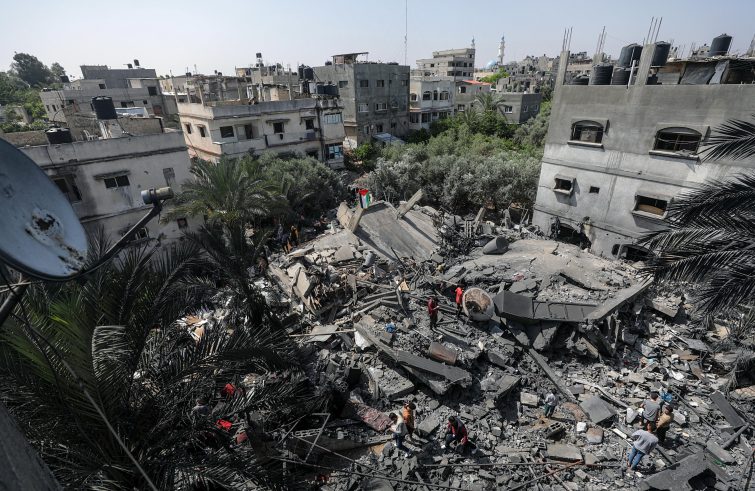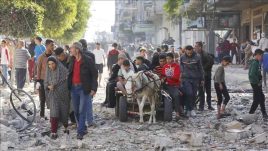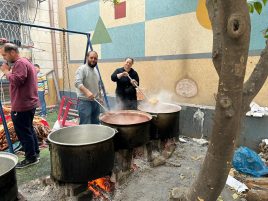
“The situation remains extremely critical and is worsening by the hour. Our Christian parishioners place all their trust and their hope in Jesus Christ. For months they have been enduring a never-ending Calvary. Like the rest of the population of the Strip, they feel the burden of a great delusion and disappointment, seeing no horizon of peace, no end to the violence and death. This conflict has already claimed more than 32,000 lives, 12,000 of them children. It is estimated that at least 8,000 people are trapped beneath the rubble.” Father Gabriel Romanelli, parish priest of the Church of the Holy Family, the only Catholic parish in Gaza, is speaking from Jerusalem, where he has been stranded since the war broke out on 7 October. Since then he has been in close contact with his parishioners, who have been sheltering in the parish compound for months, together with other displaced Christians, about 600 in all, who have lost everything in the bombardments.
 The smell of death. “A few days ago, my vicar, Father Youssef Asaad, who is currently in Gaza, said to me: ‘Abuna (Father, ed.s note), you can’t imagine how much we are suffering and how desperate the people are,'” the parish priest, a missionary of the Institute of the Incarnate Word from Argentina, told SIR.
The smell of death. “A few days ago, my vicar, Father Youssef Asaad, who is currently in Gaza, said to me: ‘Abuna (Father, ed.s note), you can’t imagine how much we are suffering and how desperate the people are,'” the parish priest, a missionary of the Institute of the Incarnate Word from Argentina, told SIR.
“The smell of death surrounds us, we can feel it, strong, everywhere.
We are overwhelmed by the piles of rubble and garbage, and the sewage systems are burst. The rain is still falling, which is a blessing, but on the other hand it worsens the environmental and hygienic conditions, because it causes a lot of humidity, which, combined with the heat of the sun, causes the smell of decomposing bodies to permeate everything, even from beneath the rubble”. “Nevertheless,” adds Father Romanelli, “every day they pray for peace and offer their suffering and hardship for a ceasefire and the release of the hostages.” There seems to be some progress on the diplomatic front. Talks between the United States and Israel have resumed to discuss a possible ceasefire. According to US National Security Advisor Jake Sullivan, an Israeli delegation is expected in Washington to continue discussing an “alternative approach” to the Rafah operation.
The kitchen is open again. Life goes on at a slow pace inside the parish. Going out is problematic because “it’s very dangerous”, remembers Father Romanelli. “The humanitarian aid packages air dropped from the sky by the US Air Force and other foreign countries, along with the aid that arrived by sea, did not reach everyone,” he explained. “They did not arrive in the parish. However, some of the parishioners managed to get some flour and the bakery started making bread again. This is a great blessing for our displaced residents. The Latin Patriarchate is also supporting us. We hope to be able to bake bread twice a week again. In this context, yesterday the parish celebrated the feast of St Joseph, the patron saint of almost all the groups present in the parish.
The parish priest explained: “Our scout group is named after St Joseph. We asked him to intercede for peace in the Holy Land, for an immediate ceasefire. We are praying that the coming of the Easter of Jesus will warm the hearts of those in power and prepare them for peace and co-existence.”
 Risk of famine. UNICEF has once again spoken out in the face of a serious humanitarian crisis. In the words of its regional director for the Middle East and North Africa, Adele Khodr, on the basis of the IPC (Integrated Food Security Phase Classification), an analysis of food security and nutrition, UNICEF denounced “an impending famine. The world’s inaction is shocking as more and more children succumb to a slow death. All border crossings must be opened now to allow unhindered access to humanitarian aid”. Oxfam also raised the alarm, citing “catastrophic levels of hunger in Gaza.” Paolo Pezzati, Oxfam Italy’s spokesman on humanitarian crises, said: “Never before have we seen such a serious situation escalate in such a short amount of time. In a few days, the population of northern Gaza will face a full-blown famine, and this situation is bound to spread to the south if there is no ceasefire and no adequate humanitarian response. Many children are already facing starvation while the international community fails to respond. Meanwhile, twice as many people are at risk of famine compared to last December. “
Risk of famine. UNICEF has once again spoken out in the face of a serious humanitarian crisis. In the words of its regional director for the Middle East and North Africa, Adele Khodr, on the basis of the IPC (Integrated Food Security Phase Classification), an analysis of food security and nutrition, UNICEF denounced “an impending famine. The world’s inaction is shocking as more and more children succumb to a slow death. All border crossings must be opened now to allow unhindered access to humanitarian aid”. Oxfam also raised the alarm, citing “catastrophic levels of hunger in Gaza.” Paolo Pezzati, Oxfam Italy’s spokesman on humanitarian crises, said: “Never before have we seen such a serious situation escalate in such a short amount of time. In a few days, the population of northern Gaza will face a full-blown famine, and this situation is bound to spread to the south if there is no ceasefire and no adequate humanitarian response. Many children are already facing starvation while the international community fails to respond. Meanwhile, twice as many people are at risk of famine compared to last December. “













